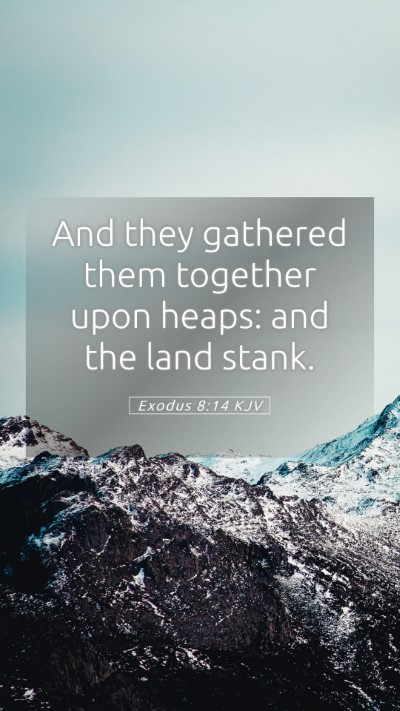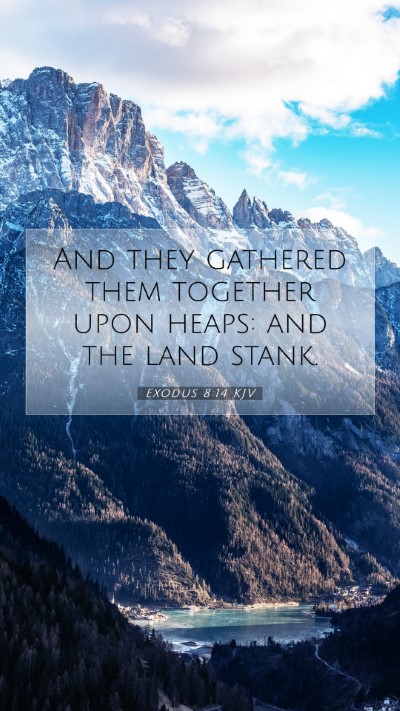Bible Verse Meaning: Exodus 8:14
In Exodus 8:14, we read: “And they gathered them together upon heaps: and the land stank.” This verse occurs during the account of the plagues God brought upon Egypt to compel Pharaoh to let the Israelites go. The "heaps" refer to the dead frogs that were a result of the second plague.
Summary of Biblical Meaning
This verse symbolizes a number of significant themes that can be unfolded through various commentaries:
- Judgment of God: The heaps of frogs serve as a vivid illustration of God’s judgment against Egypt for the oppression of His people. As noted in Matthew Henry's Commentary, God's sovereign power is displayed through the plagues, each reflecting His authority over the natural order.
- Rebellion and Consequence: Adam Clarke remarks on Pharaoh’s hardened heart. The stench of the dead frogs represents the heavy consequences of disobedience to God’s command.
- Symbol of Sin: According to Albert Barnes, the heaps symbolize the futility and corruption of sin. Just as the oppressive frogs brought disease and decay, sin leads to spiritual death and moral decay.
- Call to Repentance: This scripture serves as a reminder for believers on the importance of repentance. The accumulation of judgment is meant to lead one back to God, as emphasized in various biblical exegesis studies.
Insights from Commentaries
To better understand Exodus 8:14, let’s explore insights from prominent Bible commentators:
Matthew Henry
Matthew Henry suggests that this verse illustrates God's displeasure with sin and the consequences that follow such rebellious behavior. The gathering of the frogs in heaps was not just a mere inconvenience; it became a pungent reminder of Pharaoh’s refusal to heed God’s commands. Henry emphasizes that this corporate suffering was a direct result of Pharaoh's stubbornness.
Albert Barnes
Albert Barnes elaborates on the practical implications of the frogs’ decay, indicating a shift in the atmosphere and ecology due to Pharaoh's obstinate choices. This serves as a tableau of the effects of ignoring divine instruction, highlighting God’s authority over creation and the balance that He upholds.
Adam Clarke
Adam Clarke points out that the term "stank" not only indicates a physical odor but also symbolizes the spiritual stench arising from unrepentant sin. He stresses the need for recognition of one's sinful state before God can bring about restoration.
Application and Reflection
As we delve into the meaning of this Bible verse, various applications can be drawn:
- Recognizing Consequences: Just as Pharaoh’s rebellion brought about physical decay in the land, believers today should recognize how disobedience affects their spiritual and moral environments.
- Importance of Obedience: The importance of submitting to God’s will can’t be overstated. Reflecting on this verse serves as a reminder to actively live in accordance with God's word.
- Repentance: This verse calls for personal introspection and an attitude of repentance, where individuals acknowledge their sins rather than allow them to accumulate as unpleasant consequences.
Cross References
Exodus 8:14 can be cross-referenced with the following Bible verses:
- Exodus 7:26 - The original warning of God’s power exhibited through Aaron and Moses.
- Exodus 10:14 - Describing a future plague and the consequences of Pharaoh’s hardened heart.
- Psalm 78:45 - A poetic reminder of how God used natural elements to exact judgment.
Conclusion
The examination of Exodus 8:14 through various lenses of Bible verse commentary illustrates profound truths about God's nature and human response. Through this in-depth Bible verse analysis, believers can gain insights into the significance of obedience, the harsh realities of unrepentance, and the need for continual alignment with God’s will throughout their spiritual journey.


